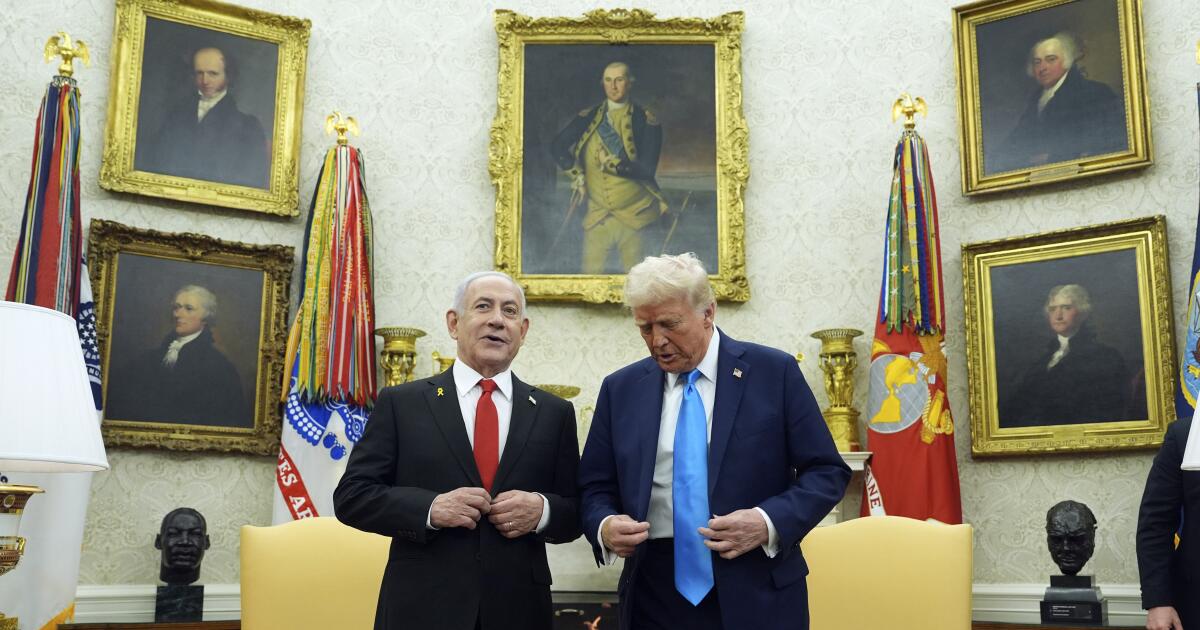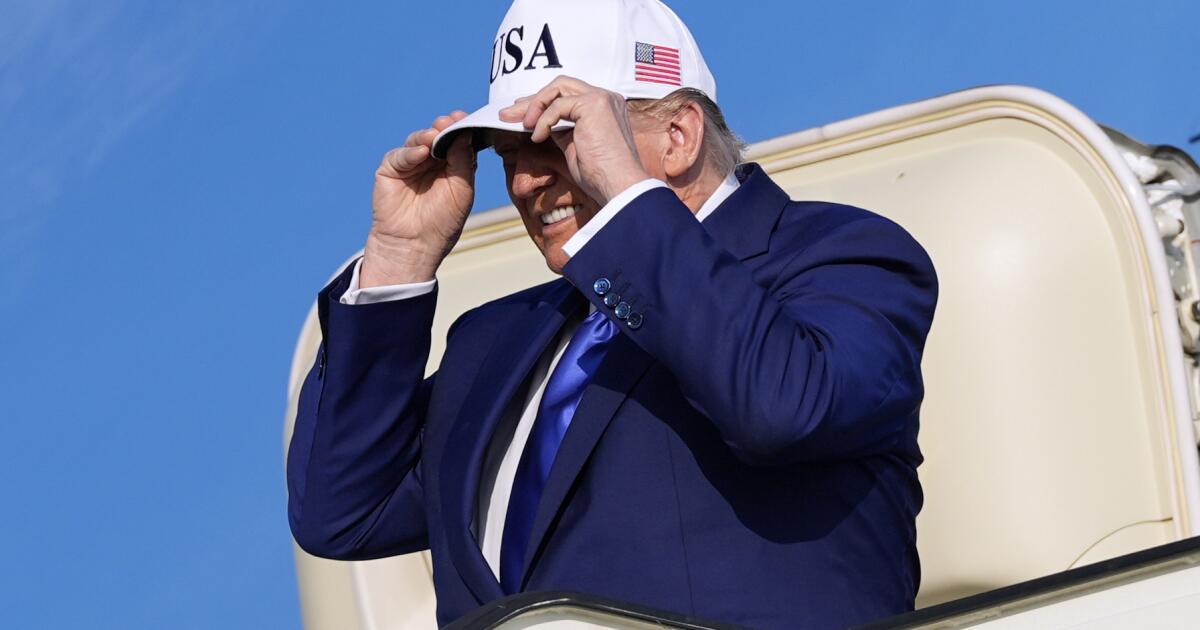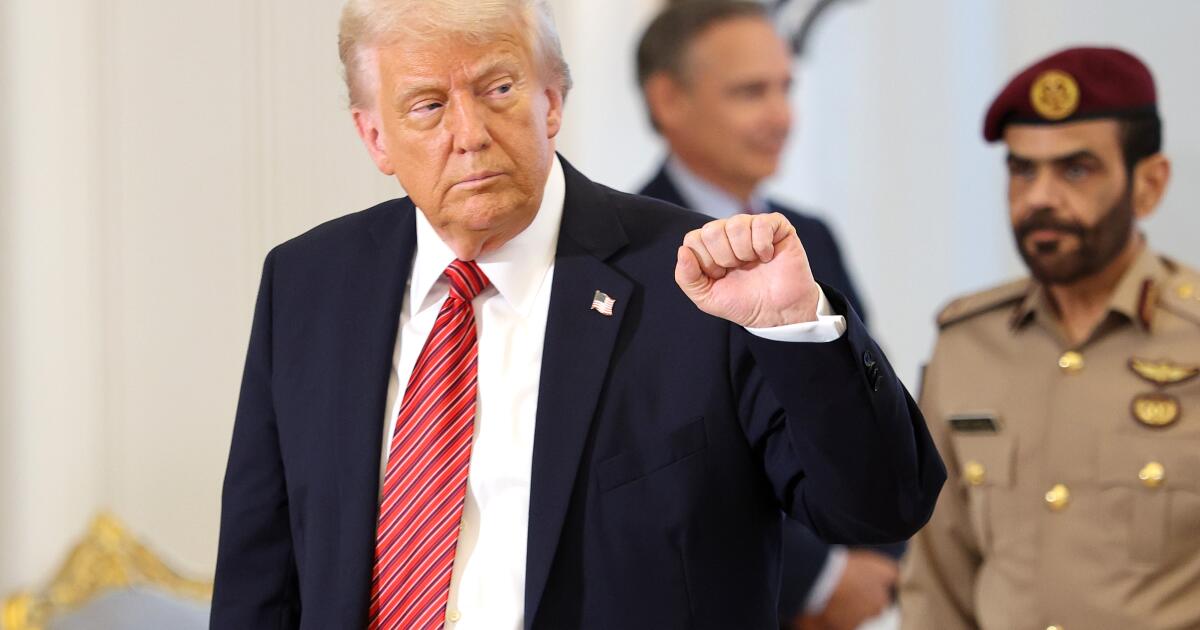Contributor: Trump’s Mideast deal is just the beginning of his role
Congratulations are in order for President Trump. He said he would bring home Israel’s hostages and end the horrific fighting in Gaza, and that appears to be exactly what he is doing with this week’s deal. While many of the ideas that went into Trump’s 20-point peace plan predated his reelection, he and his team deserve a standing ovation for translating those ideas into a practical proposal, defining a first phase that was both big and digestible and putting together all the pieces that made its agreement possible.
Success, however, does have its downsides. Remember the Pottery Barn rule of foreign policy, made famous during the Iraq war? “You break it, you own it.” We now have the Trump corollary: “You patch it, you own it.”
Despite coming to office eager to shed America’s Middle East commitments, Trump just took on a huge one: responsibility for a peace plan that will forever bear his name. On Oct. 6, 2023, the day before Hamas’ assault, Arab-Israeli relations were poised for the historic breakthrough of Saudi-Israel normalization; two years later, Arab-Israeli relations — including Trump’s first-term Middle East peacemaking achievement of the Abraham Accords — are hanging on by a thread. By offering a plan that promises not just an end to fighting in Gaza but building a full and enduring regional peace, the president has taken on the task of repairing the damage wrought by Hamas’ unholy war. In other words: fixing the Middle East.
How Trump fulfills this not inconsequential responsibility has major consequences for America’s role in the region and in the world. The Chinese are watching whether, when the going gets rough, he will have the mettle to maintain a broad alliance. The Russians are watching whether the president will strictly enforce the letter of the deal or let certain unpleasant aspects slip. The Iranians will be watching whether Trump will find himself so drowning in the details of Gaza reconstruction that he won’t be able to stitch together a repeat of the highly successful Arab-Israeli coalition that protected Israel a year ago from Iran’s barrages of ballistic missiles and drones. And all these adversaries — and others — will wonder whether the intense U.S. focus needed to ensure implementation of this deal will distract the president from their own areas of mischief.
Those are some of the international stakes. There’s a difficult road ahead in achieving the deal itself. Some of the most vexing challenges will include:
- Implementing a highly complex Gaza peace plan that, in its requirements for disarmament, envisions Hamas to be fully complicit in its organizational suicide — or at least its institutional castration;
- Having the U.S. military orchestrate the recruitment, deployment and management of multinational forces to police the territory just as the Israel Defense Forces are withdrawing from it, a tricky maneuver fraught with risk;
- Creating and supervising a transitional administration that will oversee everything from humanitarian relief to rubble and ordnance removal to massive reconstruction projects, all the while preventing what’s left of Hamas from stealing goods to divert to underground weapons factories, an art that it perfected after previous ceasefires;
- Securing buy-in from the United Nations and its specialized agencies, which need to play an essential role in delivering food and medical services, without buckling under pressure to rehabilitate the deeply flawed U.N. Relief and Works Agency for Palestine Refugees, an organization that bears special responsibility for keeping the Palestinian-Israeli conflict alive for decades;
- Preventing Qatar and Turkey — longtime friends of Hamas who have emerged in recent weeks as diplomatic Good Samaritans — from translating their current status into a malign influence over the direction of Palestinian politics, which can only be worrisome to Israel and the Ramallah-based Palestinian Authority and a long-term detriment to the cause of peace;
- And dealing every step of the way with an Israeli prime minister of a rightist coalition who will likely view every decision, great and small, through the lens of a fateful election he is expected to call very soon that will show whether the Israeli people want to punish him for the terrible errors that left Israel unprepared for Hamas’ 2023 attack or reward him for the impressive victories Israel’s military achieved across the region in the two years that followed.
Getting this far was a huge achievement. Ensuring effective execution — never a strong suit for a “big idea guy” like Trump — is a thousand times more difficult. This can’t be done with a small team of White House officials chatting on Signal. It will require an army of — please excuse the term — experts: experts in military command and control, experts in ordnance removal and disposal, experts in civilian rehabilitation and reconstruction, experts in communication and community engagement. Corporate subcontracting can address some of this, as can the impressive talents of former British Prime Minister Tony Blair, but don’t be fooled into thinking that a consulting company or a former foreign official can pick up the slack of the entire U.S. government. This plan, after all, has Trump’s name on it, not Deloitte’s or Blair’s.
The president has at least one more vital task in this matter. He must explain to the American people why we are doing this. For nearly 20 years, American presidents of both parties have said they wanted to pivot away from the Middle East, but they continually find themselves entangled in the region’s often byzantine conflicts and politics. Americans deserve to know why the “America First” president has decided that American interests are intimately bound up in the success of this peace plan. Our domestic divisions notwithstanding, fair-minded people on both sides of the aisle will be rooting for Trump’s success in this peace deal.
For now, sure, the president should enjoy the accolades and celebrate the coming release of Hamas’ hostages. The morning after will come soon enough.
Robert Satloff is executive director of the Washington Institute.


